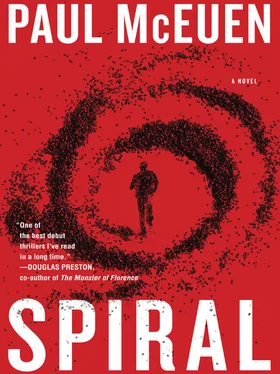It made his head hurt to think about it, especially after twenty-four straight hours in his white bunny suit in the cleanroom. The dust-free environment was kept so by a ceiling full of HEPA filters constantly chugging away, creating a low roar that crept into your bones.
He scanned the rows of equipment, seeing only a couple of other users. A seminar was going on about a new kind of solar cell based on carbon nanotubes that had everyone jazzed. In a few more minutes, the seminar would end and the cleanroom would begin filling up again. The electron beam lithography machines were running—the demand on those was relentless. People were also camped out on the various other machines—the evaporators, ion millers, and etchers. They were all in their anti–dust bunny suits, conducting a defensive war against particles of dust and flecks of skin.
Xintao began to gather everything up. He was nearly done.
He heard a beep.
Strange . Near the RF plasma cleaning chamber. That was when he spied it. He’d sat before the machine time and time again, waiting for his sample to be finished. The wall behind the chamber was imprinted on his memory. Two brass pipes running vertically, delivering water to the cooling head.
Now there were three.
He approached the third pipe, touched his hand to it. The pipe was vibrating ever so slightly.
Xintao wasn’t sure why, but he immediately panicked. He stared at the pipe for a few seconds, then quickly glanced around, looking for one of the staff.
To his surprise, the pipe beeped again. Quietly, like an alarm clock sounding in another room. He pulled his hand back, walked away briskly, certain that he had to find someone from the staff.
He didn’t get far before the blast hit him.
LEON SOLOMON, THE FBI’S CHIEF COUNTERTERRORISM SPECIALIST, arrived in the back of an unmarked van after a short ride over from the J. Edgar Hoover Building. A barricade of cruisers, orange cones, and yellow police tape kept the crowd from getting too close to the wreckage. Twelve FBI men were already on-site in addition to hundreds of local firefighters and police. The crowd was big and growing, drawn by the irresistible lure of destruction. Some were slack-jawed, frozen in shock. Others had a strange kind of energy about them, an almost giddy excitement. Something had happened .
Solomon had a straight visual line to the carnage. The windows of the building were blown completely out, glass and concrete littering the street. A section of wall midway up the building was torn loose, tenuously hanging in space by a few strands of rebar. The TV vultures were everywhere, all three networks. Two helicopters circled overhead. The media were jumpy, hyped up, and ready to pounce. The press in New York were told that the shutdown of Bellevue was because of an outbreak of SARS. Total bullshit, and a few of the reporters were smelling it. You don’t send in the Chemical Biological Incident Response Force for SARS. And now, a day later, an explosion at the University of Maryland.
Solomon was anxious as hell. By design, a university campus was a hub of dissemination, full of people from around the world—people who would seek to return home in a time of crisis. Rescue workers, students, professors rush in, breathe the pathogen, and you’ve got an outbreak that sweeps across the campus, then the city, then the country, then around the world. If you wanted to spread a pathogen, this was a hell of a way to do it.
There had been a wild shouting match when the anonymous email had arrived in Sadie Toloff’s inbox, claiming credit for the explosion. The FBI director demanded they seal off the whole university, evacuate the entire College Park area. But they had dodged a bullet in Manhattan, and everyone was feeling lucky. The results had come in from Toloff’s lab at Detrick fifty minutes before. The kid in Times Square had been loaded with LSA—d-lysergic acid amide—one of the primary psychotropic alkaloid products produced by the Uzumaki. But the LSA was pharmaceutical-grade, likely administered by injection. All the genetic markers were negative for the actual fungus. The kid did not have an Uzumaki infection. He was going to make it. The Times Square incident was an elaborate ruse.
As for the mysterious Asian woman’s profile, the CIA thought she could be a member of one of the ultranationalist, anti-Japanese groups, such as Sunshine 731 or Black Sword. These radical groups were furious that the United States would not turn over Hitoshi Kitano for prosecution as a war criminal. She was playing games, seeking publicity, that’s what the profilers said.
Solomon wasn’t so sure.
Inside, he met up with the local fire chief and the shell-shocked director of the facility. The main atrium was utter chaos. Debris—wood, glass, chairs, railings, piping—was strewn about the floor. One of the skylights overhead was shattered. The fire chief pointed inside. “It’s in there. That’s where the bomb was.”
Solomon went in, going straight to the epicenter of the explosion, scanning the wreckage for the item mentioned in the email. The fire chief filled in the details. As best they could tell, the explosive was fitted inside a fake section of piping. Thankfully, the student who saw it had survived, though he’d lose an arm and sight in both eyes. He’d told them that it had started to make a noise. It had likely been set off remotely.
But it wasn’t the details of the bomb that interested Solomon. It was another item, one that no one else had yet noticed, partially obscured by a piece of plaster. Just like the anonymous email had said, right there on the floor, glinting in the rescue spotlights.
A goddamn brass cylinder.
 27
27 
MAGGIE WAS BEGINNING TO UNDERSTAND HOW FUSARIUM spirale could be turned into a devastating biological weapon.
During World War II, genetics was still a new science. No one was even sure that DNA was the basis for genetic information until the Hershey-Chase experiments on T2 viruses in 1952. Even with today’s techniques for splicing and dicing genomes, creating a successful genetically modified organism was a huge undertaking.
But the scientists at Unit 731 had chosen well.
Fusarium spirale was relatively harmless when it lived in your gut, viciously dangerous when it infected a corn plant. If you want to make a monster out of it, all you had to do was scramble its genetic programming. Turn off a few genes, turn on a few others, get its signals mixed. Make it pump out toxins when it was living inside you. Maggie shuddered at the thought. You’d have a chemical weapons factory killing you from the inside out.
Maggie could guess how they’d done it. They could have used chemicals or radiation to induce mutations, then test them on human subjects. Cultivate the ones that killed the quickest. If you were a sadistic monster willing to use live human subjects, you didn’t need biotechnology.
Maggie felt the mysteries shrouding her grandfather dissolving away, the pieces of his life coming together. Her grandfather had gone to work at Detrick right after the war. Liam never talked about it, but she had gathered threads from what her grandmother Edith had told her. In the months before she died, Edith and Maggie spent a great deal of time together. Maggie loved to get her talking, to tell the stories of her life. It made Edith happy, distracting her when she was in great pain from the treatments. Edith said that Liam had insisted that they move to Maryland so he could continue his work at Camp Detrick. “He never was quite the same after the war,” she said. “He had nightmares. It must have been terrible. I can’t imagine.”
Читать дальше

 27
27 










